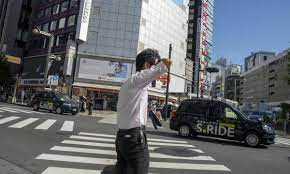Loading
Search
▼ Teenager Among 15 Heat-Related Deaths As Japan And South Korea Swelter
- Category:Other
In South Korea, 12 people died from heat-related deaths last weekend, while in Japan, three people died including a 13 year-old on her way back from school
Twelve people have died from heat-related causes in South Korea as it swelters through a heatwave, while in Japan it emerged a 13-year-old girl had died from heatstroke on her way back from a school club.
South Korea’s Yonhap news agency reported that at least five of those who died over the weekend were farmers, and at least seven were over 70, including some in their 90s. Most of the country has been under a heatwave warning – issued when temperatures pass 35C – since Tuesday.
Over the previous week, three people are believed to have died from heat-related causes.
In Japan, a 13-year-old girl was found unconscious on a pavement on Friday. She had been cycling home after attending a school club and was taken to hospital where she later died from what authorities believe was heatstroke, the Mainichi reports.
The school had suspended the club gatherings an hour early due to concerns about the heat and said that students had taken breaks “every 20-25 minutes to rehydrate”, the Mainichi reported.
Elsewhere, an elderly couple were found dead in their home in Tokyo by a healthcare worker, bringing the death toll since Friday to three. Police believe they died of heatstroke as temperatures in the city reached 35.7C and their air conditioning was not on.
The deaths in Japan comes weeks after the government set a target to halve the number of heat-related deaths by 2030.
Statistics from the health ministry reported by the Japan Times show that the number of heatstroke-related deaths increased from an average of 201 people a year between 1995 and 1999, to an average of 1295 from 2018 to 2022. Between 80 and 90% of those who die are over 65, according to data cited by the Japan Times.
Research shows that older people are more vulnerable to heatwaves. Japan has the second-highest proportion of people 65 and over worldwide, which has important implications for climate change adaptation.
By 2025, one in five people in South Korea are expected to be older than 65, making it home to a “super ageing population”, according to research published in the Lancet. By 2050, 44% of South Koreans may be over 65.
Japan has revised its climate change adaptation law to introduce a “special heatstroke alert”, based on a measurement called the “wet bulb globe temperature” index.
When heat and humidity combine, sweat doesn’t evaporate, which limits the body’s ability to cool itself. The wet bulb temperature (WBT) index uses both heat and humidity to give an indication of how dangerous a heatwave is.
A dangerous wet bulb temperature is usually considered to be 35C, which is an air temperature of 40C and relative humidity of 75%, but the threshold may be lower.
The special alerts are expected to be introduced in 2024, the Japan Times reported.
- August 2, 2023
- Comment (0)
- Trackback(0)


